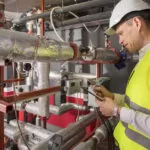As a responsible building owner in the dynamic state of Texas, you understand the importance of maintaining an efficient and well-functioning water system. One key aspect that often goes unnoticed is the intricate science behind hot & cold-water calculations. In this comprehensive guide, we will delve into the crucial details of hot and cold-water calculations, shedding light on the significance of accurate calculations for optimal building performance.
Table of Contents
Understanding the System: Hot & Cold-Water Calculations
Hot and cold-water systems are the lifeblood of any building, ensuring a seamless supply of water for various purposes. In Texas, where the climate can be extreme, these systems play a vital role in maintaining comfort for occupants. Hot-water systems are responsible for providing warmth, especially during colder months, while cold-water systems are essential for everyday needs such as drinking, cleaning, and sanitation.

Accurate Sizing of Water Pipes
One fundamental aspect of hot and cold-water calculations is the sizing of water pipes. Properly sized pipes are crucial for maintaining adequate water pressure and flow throughout the building. Undersized pipes can lead to reduced water pressure, resulting in inconveniences such as slow-flowing faucets and inefficient appliances. On the other hand, oversized pipes may lead to unnecessary energy consumption and increased costs.
When calculating pipe sizes, factors such as the building’s layout, the number of fixtures, and peak water demand must be taken into account. Collaborating with a qualified engineer or plumbing professional can help ensure accurate calculations tailored to the specific needs of your building.
Efficiency in Water Heating Systems
In the scorching Texas summers, the demand for cold water is high, while in the colder months, the need for hot water becomes paramount. Efficient water heating systems are essential for meeting these dynamic demands. Evaluating the efficiency of your water heating system involves considering the type of heating equipment, insulation, and the overall design of the system.
Selecting the right water heater size is crucial to avoid energy waste and ensure a constant supply of hot water during peak usage periods. Tankless water heaters, for example, provide on-demand hot water, reducing energy consumption compared to traditional tank-based systems.
Temperature Considerations for Texas Climate
The unique climate of Texas poses specific challenges for hot and cold-water systems. In the scorching summer heat, cold-water demand increases, while in the winter, heating requirements become more pronounced. Building owners must carefully consider these temperature variations when designing or upgrading their water systems.
Insulating pipes is a cost-effective way to prevent heat loss in hot-water systems and protect against freezing in cold-water systems during rare cold spells. Proper insulation helps maintain water temperatures, ensuring energy efficiency and preventing potential damage to pipes.
Water Conservation Strategies
In a state where water scarcity is a concern, implementing water conservation strategies is not just environmentally responsible but also financially prudent. Low-flow fixtures, efficient appliances, and smart irrigation systems can significantly reduce water consumption without compromising functionality.
Calculating water usage patterns and identifying opportunities for conservation can lead to long-term cost savings for building owners. Additionally, adopting water-efficient technologies aligns with the growing emphasis on sustainability and environmental responsibility.
Regular Maintenance and Monitoring
Once your hot and cold-water systems are in place, regular maintenance is crucial for ensuring optimal performance and longevity. Periodic inspections, leak detection, and addressing issues promptly can prevent costly repairs and downtime. Monitoring water usage patterns and adjusting systems accordingly can also contribute to ongoing efficiency.
Conclusion
As a building owner in Texas, understanding and implementing efficient hot and cold-water calculations is essential for the overall functionality of your property. From sizing pipes to selecting the right water heating system and considering the unique climate factors, every decision plays a role in the efficiency and sustainability of your water systems.
By prioritizing accurate calculations, embracing water conservation measures, and staying proactive in maintenance, you can not only enhance the comfort of occupants but also contribute to the responsible use of water resources. As Texas continues to grow and evolve, responsible building practices become increasingly important, and a well-designed hot and cold-water system is a cornerstone of a thriving property.




